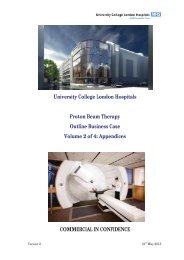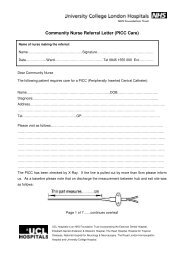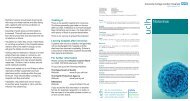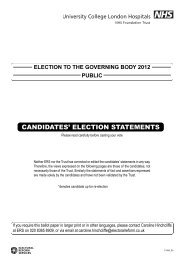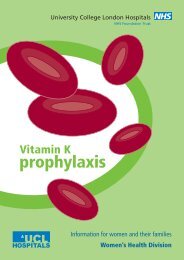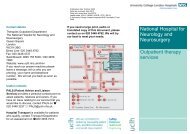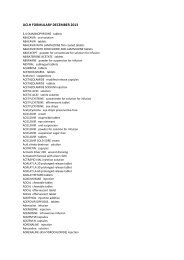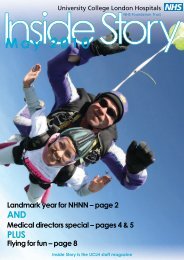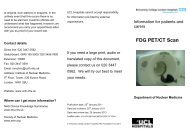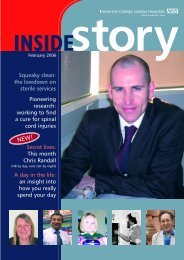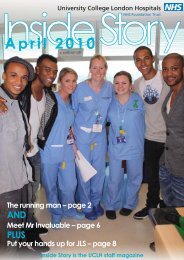the virology user manual - University College London Hospitals
the virology user manual - University College London Hospitals
the virology user manual - University College London Hospitals
Create successful ePaper yourself
Turn your PDF publications into a flip-book with our unique Google optimized e-Paper software.
This is a CONTROLLED document.<br />
Any document appearing in paper form that is not printed on green paper is not controlled and should not be used.<br />
UCLH NHS FOUNDATION TRUST<br />
DEPARTMENT OF VIROLOGY<br />
USER MANUAL<br />
Version 15.0<br />
June 2013<br />
Page 1 of 21
This is a CONTROLLED document.<br />
Any document appearing in paper form that is not printed on green paper is not controlled and should not be used.<br />
TABLE OF CONTENTS<br />
MISSION STATEMENT.......................................................................................................3<br />
INTRODUCTION .................................................................................................................3<br />
LOCATION ..........................................................................................................................4<br />
POSTAL ADDRESS............................................................................................................4<br />
WORKING HOURS .............................................................................................................4<br />
CONTACTING US DURING WORKING HOURS ...............................................................5<br />
CONTACTING US OUT OF WORKING HOURS................................................................5<br />
KEY CONTACTS - LABORATORY ....................................................................................5<br />
KEY CONTACTS – CONSULTANTS..................................................................................5<br />
SERVICES AVAILABLE .....................................................................................................6<br />
HIGH RISK SPECIMENS AND SAFETY ............................................................................7<br />
REQUEST FORMS..............................................................................................................7<br />
SPECIMEN VOLUME..........................................................................................................8<br />
COLLECTION OF SPECIMENS .........................................................................................8<br />
SPECIMEN LABELLING.....................................................................................................8<br />
TRANSPORT OF SPECIMENS ..........................................................................................9<br />
VIROLOGY CUT OFF TIMES .............................................................................................9<br />
COMMUNICATION OF RESULTS......................................................................................9<br />
MEDICAL ADVICE ............................................................................................................10<br />
LIMITATIONS AND UNCERTAINTIES .............................................................................10<br />
QUALITY ASSURANCE ...................................................................................................11<br />
COMPLAINTS ...................................................................................................................11<br />
TURNAROUND TIMES, SPECIMEN TYPES and INVESTIGATIONS .............................11<br />
RETENTION OF SPECIMENS AND REQUESTING OF ADDITIONAL TESTS ...............12<br />
REFERENCE LABORATORIES .......................................................................................12<br />
OTHER SEROLOGY.........................................................................................................12<br />
UCLH VIROLOGY TEST REPERTOIRE AND TURNAROUND TIMES ...........................14<br />
Page 2 of 21
This is a CONTROLLED document.<br />
Any document appearing in paper form that is not printed on green paper is not controlled and should not be used.<br />
MISSION STATEMENT<br />
We aim to provide our <strong>user</strong>s with:<br />
An exemplary diagnostic <strong>virology</strong> laboratory service<br />
An expert clinical advisory service for <strong>the</strong> diagnosis, management and control of infections<br />
Assistance with <strong>the</strong> investigation of infectious disease outbreaks<br />
Advisory support for emerging viral infections<br />
A rapid response to comments, requests and criticisms<br />
INTRODUCTION<br />
The Virology Laboratory, <strong>University</strong> <strong>College</strong> <strong>London</strong> <strong>Hospitals</strong> NHS Foundation Trust is accredited<br />
by Clinical Pathology Accreditation (UK) Limited and receives in excess of 250,000 requests per<br />
year. In addition to <strong>the</strong> routinely available tests used to diagnose and monitor viral infections <strong>the</strong><br />
assay development group of <strong>the</strong> department develops and provides novel molecular diagnostic<br />
assays. The Virology Laboratory is an acknowledged reference laboratory for HIV, hepatitis B,<br />
hepatitis C and molecular diagnosis and has a special interest and expertise in:<br />
(1) HIV and o<strong>the</strong>r retroviral infections<br />
(2) Viral hepatitis, especially hepatitis B and C infections<br />
(3) Respiratory viral infections<br />
(4) Viral infections in <strong>the</strong> immunocompromised patient<br />
(5) Viral infections of <strong>the</strong> foetus<br />
(6) Molecular testing for MRSA, Chlamydia and GC.<br />
Medical and laboratory staff are happy to discuss any problems relating to <strong>the</strong> diagnosis and<br />
management of patients with viral infections and also with any issues about <strong>the</strong> quality of <strong>the</strong><br />
service provided to you.<br />
This <strong>manual</strong> is intended to enable all <strong>user</strong>s to make best use of <strong>the</strong> various services provided,<br />
ensuring an accessible, equitable and efficient service.<br />
This <strong>manual</strong> describes <strong>the</strong> clinical and laboratory services available to <strong>user</strong>s from <strong>the</strong> following<br />
areas:<br />
UCL <strong>Hospitals</strong> NHS Foundation Trust:<br />
o Eastman Dental Hospital<br />
o Heart Hospital<br />
o Hospital for Tropical Diseases (HTD)<br />
o National Hospital for Neurology and Neurosurgery (NHNN)<br />
o Royal <strong>London</strong> Hospital for Integrated Medicine<br />
o Royal National Throat, Nose and Ear<br />
o <strong>University</strong> <strong>College</strong> Hospital (UCH)<br />
o UCH Elizabeth Garrett Anderson (EGA) Wing<br />
o UCH Macmillan Cancer Centre<br />
Central and North West <strong>London</strong> NHS Foundation Trust (CNWL) (Mortimer Market<br />
and Archway Sexual Health Clinic)<br />
General Practitioners in Camden and Islington<br />
Camden & Islington Mental Health and Social Care Services Trust<br />
Podiatry & Family Planning Services<br />
Page 3 of 21
This is a CONTROLLED document.<br />
Any document appearing in paper form that is not printed on green paper is not controlled and should not be used.<br />
LOCATION<br />
The Virology Laboratory, <strong>University</strong> <strong>College</strong> <strong>London</strong> <strong>Hospitals</strong> NHS Foundation Trust, <strong>London</strong> is<br />
located in 60 Whitfield Street.<br />
Nearest tube stations:<br />
Warren Street Tube Station<br />
(Nor<strong>the</strong>rn Line, Victoria Line)<br />
Goodge Street Tube Station<br />
(Nor<strong>the</strong>rn Line)<br />
POSTAL ADDRESS<br />
Virology Laboratory, Clinical Microbiology and Virology<br />
<strong>University</strong> <strong>College</strong> <strong>London</strong> <strong>Hospitals</strong> NHS Foundation Trust<br />
60 Whitfield Street<br />
<strong>London</strong><br />
W1T 4EU<br />
Internet address: www.uclh.nhs.uk<br />
WORKING HOURS<br />
Routine opening<br />
Monday to Friday 9 am to 5 pm.<br />
Specimens cannot be received outside <strong>the</strong>se times without prior arrangement.<br />
Out of hours<br />
Requests for <strong>the</strong> provision of laboratory testing outside normal working hours may be<br />
accommodated under exceptional circumstances. These should be arranged with <strong>the</strong> consultant<br />
on-call who may be air-called through <strong>the</strong> UCLH switchboard (020 3456 7890 / 0845 155 5000).<br />
Consultant advice<br />
Advice on <strong>the</strong> diagnosis, treatment and containment of viral infections in patients is available at any<br />
time through <strong>the</strong> 24 hour consultant led on-call service. The consultant providing this cover is<br />
always contactable through <strong>the</strong> UCLH switchboard (020 3456 7890 / 0845 155 5000).<br />
Page 4 of 21
This is a CONTROLLED document.<br />
Any document appearing in paper form that is not printed on green paper is not controlled and should not be used.<br />
CONTACTING US DURING WORKING HOURS<br />
To contact us regarding laboratory enquiries<br />
General enquiries 020 344 78994<br />
Fax 020 344 79211<br />
Serology results 020 344 78994<br />
Molecular results 020 344 78964<br />
To contact us for medical advice<br />
Duty SpR 020 344 78986 / 78975<br />
07946 202 872 (mobile)<br />
CONTACTING US OUT OF WORKING HOURS<br />
On call Consultant via <strong>the</strong> UCLH Switchboard (020 3456 7890 / 0845 155 5000)<br />
ask for <strong>the</strong> on-call Virologist (pager 299)<br />
KEY CONTACTS - LABORATORY<br />
Mr Jim Waite<br />
Dr Paul Grant<br />
Serology Section Head<br />
e-mail: jim.waite@uclh.nhs.uk<br />
020 344 78979<br />
Molecular Section Head<br />
e-mail: paul.grant@uclh.nhs.uk<br />
020 344 78993<br />
KEY CONTACTS – CONSULTANTS<br />
Dr Eleni Nastouli<br />
Dr Mike Kidd<br />
Professor Deenan Pillay<br />
Consultant / Honorary Senior Lecturer<br />
e-mail: eleni.nastouli@uclh.nhs.uk<br />
020 344 78987<br />
Consultant Clinical Scientist / Honorary Senior Lecturer<br />
e-mail: michael.kidd@uclh.nhs.uk<br />
020 344 78991<br />
Professor / Hon Consultant, Head of Centre for Virology (UCL)<br />
e-mail: d.pillay@ucl.ac.uk<br />
020 3108 2117<br />
KEY CONTACTS – SERVICE<br />
Dr. Bruce Macrae<br />
Shelley Wilson<br />
Clinical Lead, Consultant<br />
e-mail: bruce.macrae@uclh.nhs.uk<br />
020 344 78331<br />
Virology Service Manager<br />
e-mail: shelley.wilson@uclh.nhs.uk<br />
020 344 78989<br />
Page 5 of 21
This is a CONTROLLED document.<br />
Any document appearing in paper form that is not printed on green paper is not controlled and should not be used.<br />
Diagnosing viral infections: a brief guide<br />
SERVICES AVAILABLE<br />
Tests for recent infection:<br />
(1) Polymerase chain reaction (PCR) for detection of viral nucleic acid (ei<strong>the</strong>r RNA or DNA) is our<br />
front line assay to detect many viral pathogens. Preferred specimens are from <strong>the</strong> anatomical<br />
system where you think <strong>the</strong> virus is, as early as possible in <strong>the</strong> course of infection. For<br />
example, in suspected respiratory infection please collect respiratory specimens ra<strong>the</strong>r <strong>the</strong>n<br />
blood for antibodies and, in patients with vesicular rash or genital ulcers, send us a swab of a<br />
lesion ra<strong>the</strong>r than blood for antibodies.<br />
(2) In non-specific illnesses such as malaise, tiredness, myalgia etc., unless <strong>the</strong>re are localising<br />
symptoms/signs, it is not worth sending blood specimens without discussion with Virology.<br />
(3) Blood specimens (EDTA) remain useful, especially for HIV, hepatitis viruses, HTLV,<br />
parvovirus B19, measles, rubella and EBV. Please do not send blood for respiratory or<br />
gastrointestinal viruses.<br />
(4) Please provide brief patient clinical details with duration of illness (date of onset), which<br />
allows us to choose appropriate tests.<br />
(5) Suspected viral haemorrhagic fever or SARS or o<strong>the</strong>r exotic viruses in returning traveller:<br />
contact duty Virologist and Infectious/Tropical Diseases team for discussion as investigating<br />
for <strong>the</strong>se pathogens might have significant infection control implications.<br />
(6) Our laboratory also provides a diagnostic service for syphilis (send EDTA blood for serology<br />
and/or ulcer swab for PCR) and for Lyme disease (send EDTA blood for serology).<br />
(7) Molecular MRSA testing service (send red topped swab).<br />
(8) Molecular Chlamydia and GC testing service.<br />
Please see also table showing diseases and specimens to be collected for virological diagnosis<br />
later in this <strong>manual</strong>.<br />
Tests for immunity:<br />
(1) Post-vaccine testing for immunity is NOT routinely recommended for measles, mumps, VZV<br />
and hepatitis A as <strong>the</strong> assays used are reliable to detect vaccine induced IgG.<br />
(2) Tell us about <strong>the</strong> dates and doses of HBV or rubella vaccines administered.<br />
(3) We can test for previous exposure and / or immunity to: CMV, EBV, parvovirus B19, hepatitis<br />
A, hepatitis B and VZV.<br />
Urgent specimens<br />
(1) Pregnant, in recent contact with a case of chickenpox: if <strong>the</strong>re is clear history of chickenpox in<br />
<strong>the</strong> past, no testing is necessary. O<strong>the</strong>rwise, please supply details of date of contact and type<br />
of contact (face-to-face / same room for 15 mins / own child).<br />
(2) For all o<strong>the</strong>r urgent testing please phone <strong>the</strong> laboratory so that we can identify your patient’s<br />
specimen. Include your contact number on <strong>the</strong> request form.<br />
What NOT to do…….<br />
In order to get <strong>the</strong> best out of <strong>the</strong> diagnostic service, please:<br />
<br />
<br />
<br />
<br />
avoid <strong>the</strong> terms ‘viral titres’ and ‘TORCH screen’, <strong>the</strong>y are confusing and obsolete<br />
do not send ANY unsigned request forms, especially for HIV testing<br />
do not send request forms without <strong>the</strong> patient’s date of birth and your contact number<br />
do not send specimens from suspected chronic fatigue syndrome: contact Virologist first for<br />
discussion.<br />
Page 6 of 21
This is a CONTROLLED document.<br />
Any document appearing in paper form that is not printed on green paper is not controlled and should not be used.<br />
HIGH RISK SPECIMENS AND SAFETY<br />
Pathogens are classified in hazard groups 1 to 4, with hazard group 1 being non-pathogenic to<br />
humans and hazard group 4 <strong>the</strong> most dangerous pathogens to humans. Hazard group 4<br />
pathogens include viruses causing viral haemorrhagic fever (Ebola, Marburg, Lassa, CCHF)<br />
viruses.<br />
Specimens from patients with a suspected viral haemorrhagic fever (a history of having returned<br />
from Africa, Asia and South America within 21 days) are HIGH RISK. Contact <strong>the</strong> on-call Virologist<br />
before sending any specimens to <strong>the</strong> laboratories. The consultant virologist will advise on <strong>the</strong><br />
appropriate specimens to be collected and appropriate transport. High risk specimens must be<br />
sent to <strong>the</strong> laboratory using appropriate packaging.<br />
VIRAL HAEMORRHAGIC FEVER (EBOLA, MARBURG, LASSA, CCHF)<br />
AVIAN INFLUENZA / MERS CORONAVIRUS / H7N9 INFLUENZA<br />
Contact Virologist immediately - Air call on call Virologist (pager 299) through UCLH<br />
switchboard (020 3456 7890 / 0845 155 5000).<br />
REQUEST FORMS<br />
Request forms are clearly labelled as “Virology” request forms and have a bag attached for <strong>the</strong><br />
specimen. Please send requests for Virology on a separate form from requests going to o<strong>the</strong>r<br />
departments. Ideally serology and molecular requests should be sent on separate request forms.<br />
Specimens accompanied by <strong>the</strong> wrong, or inadequately completed, request form may result in<br />
unnecessary delays.<br />
The minimum data we require for patient details marked on each request form are:<br />
Patient surname AND first name (please use ONLY capital letters)<br />
Hospital Number (for GP’s – your reference number)<br />
Date of Birth<br />
Sex<br />
Ward or Address for report<br />
Requestor identification and contact details<br />
For hospital patients, please provide details of <strong>the</strong> patient’s consultant<br />
Date and time specimen taken<br />
Type of specimen<br />
Tests required. Please avoid general terms such as “viral screen” as this may lead to<br />
delays in processing <strong>the</strong> specimen appropriately.<br />
O<strong>the</strong>r useful details<br />
Bleep number or mobile number, in order to phone significant results<br />
All relevant clinical details including:<br />
o Date of onset and duration of illness<br />
o History of foreign travel including return dates<br />
o If pregnant, indicate <strong>the</strong> gestational age<br />
o Relevant treatment history<br />
The importance of accuracy when completing <strong>the</strong> form, labelling <strong>the</strong> specimen, and <strong>the</strong><br />
provision of relevant clinical details cannot be over-emphasised. For patient safety reasons,<br />
mislabelled specimens will not be processed.<br />
Page 7 of 21
This is a CONTROLLED document.<br />
Any document appearing in paper form that is not printed on green paper is not controlled and should not be used.<br />
SPECIMEN VOLUME<br />
For most single investigations a minimum volume of 4ml of blood is required. Larger<br />
volumes may be needed for multiple investigations or two separate specimens where both<br />
serological and molecular testing is required. Neonatal / paediatric specimens should<br />
indicate <strong>the</strong> priority tests when small volumes are sent.<br />
Please contact <strong>the</strong> laboratory for fur<strong>the</strong>r guidance on specimen volumes if only a small volume is<br />
available or if sending separated plasma or serum.<br />
COLLECTION OF SPECIMENS<br />
In order to provide you with <strong>the</strong> best quality results, it is essential that good specimens are<br />
collected properly and at <strong>the</strong> appropriate time. It is also important that <strong>the</strong>y are transported to <strong>the</strong><br />
laboratory without undue delay. This enables <strong>the</strong> laboratory and <strong>the</strong> medical staff to provide a<br />
meaningful report and an interpretation relevant to <strong>the</strong> patient's illness.<br />
Inappropriate specimens or those that are damaged or leaking are liable to be discarded. Should<br />
this occur, every attempt will be made to inform <strong>the</strong> <strong>user</strong> that a second specimen may be required.<br />
Specimen collection<br />
Please ensure that <strong>the</strong> correct specimen container is used. If unsure which specimen type to<br />
examine or how to collect a particular specimen type, please contact <strong>the</strong> laboratory (020 344<br />
78994) for advice.<br />
Dry swabs are not appropriate. Use Copan brand swabs which come with <strong>the</strong>ir own vial of<br />
transport medium in <strong>the</strong> same packet. This has a long shelf life at room temperature. It is ideal for<br />
genital ulcers, vesicular rash, eye swabs and respiratory swabs.<br />
These can be ordered through NHS Logistics; code HHD 116 for <strong>the</strong> small 1mL container.<br />
Use <strong>the</strong> swab provided: snap off into <strong>the</strong> bottle and replace cap.<br />
CSF should be sent in a sterile Universal container not in transport medium.<br />
Please use red topped double headed swabs for molecular MRSA screening.<br />
The laboratory’s preferred blood specimen type is an EDTA (purple topped container) blood for<br />
serological as well as molecular tests. EDTA specimens are essential for molecular tests.<br />
For serological tests only, a clotted (red top) or SST (yellow top) blood may be substituted for<br />
EDTA blood.<br />
SPECIMEN LABELLING<br />
Complete patient details must be clearly marked on BOTH <strong>the</strong> request form AND <strong>the</strong> specimen<br />
container before insertion into <strong>the</strong> plastic bag and before it is sealed ready for transportation. Do<br />
not use pins or staples as this is hazardous.<br />
The specimen must be labelled with <strong>the</strong> same patient details as that on <strong>the</strong> request form.<br />
Please ensure that <strong>the</strong> full patient name and <strong>the</strong> date of specimen collection are legible.<br />
The importance of accuracy when completing <strong>the</strong> form, labelling <strong>the</strong> specimen, and <strong>the</strong><br />
provision of relevant clinical details cannot be over-emphasised. For patient safety reasons,<br />
mislabelled specimens will not be processed.<br />
Page 8 of 21
This is a CONTROLLED document.<br />
Any document appearing in paper form that is not printed on green paper is not controlled and should not be used.<br />
TRANSPORT OF SPECIMENS<br />
Specimens should be sent direct to <strong>the</strong> Virology Specimen Reception at 60 Whitfield Street W1T<br />
4EU.<br />
Routine specimens<br />
Routine specimens from UCH should be sent via <strong>the</strong> pneumatic tube system. Specimens from<br />
o<strong>the</strong>r sites, including GPs, should be sent using <strong>the</strong> regular courier service to 60 Whitfield Street.<br />
Specimens may also be sent by post. Please refer to <strong>the</strong> Trust policy:<br />
http://insight/pandp/Trustwide%20policies1/Specimen%20and%20PTS%20Transport%20Policy%2<br />
0and%20Procedure.pdf<br />
Urgent requests – refer to Page 5 for <strong>the</strong> correct numbers<br />
During working hours – discuss with <strong>the</strong> laboratory first<br />
Out-of-hours – discuss with on-call Virologist, including transport to <strong>the</strong> laboratory<br />
On rare occasions, <strong>the</strong> quickest way to get an urgent specimen to <strong>the</strong> Virology laboratory may be<br />
for a member of ward staff to carry it instead of calling a medical courier. In this situation, staff<br />
should always carry <strong>the</strong> specimen in a suitable rigid container. Such containers should be available<br />
on each ward. Spare/replacement containers can be obtained from Virology Specimen Reception.<br />
The sender is responsible for ensuring <strong>the</strong> health and safety of any courier or taxi service<br />
that is used to transport specimens to <strong>the</strong> Clinical Virology laboratory.<br />
If sent by post or by external courier, specimens must be in a sealed container, sealed in a plastic<br />
bag. The primary container must be surrounded by sufficient absorbent packing material to take up<br />
any leakage from <strong>the</strong> primary container during transit. Bags must <strong>the</strong>n be placed in an approved<br />
outer container which satisfies current postal or o<strong>the</strong>r transport regulations.<br />
Guidance on <strong>the</strong> transporting of specimens, including specimens requiring category A transport<br />
when being transported by road in <strong>the</strong> UK, may be found at<br />
https://www.gov.uk/government/uploads/system/uploads/attachment_data/file/48846/guidancenote-17.pdf.<br />
VIROLOGY CUT OFF TIMES<br />
Virology cut-off times for processing specimens with a same day turnaround time (TAT).<br />
Specimen type<br />
Respiratory specimen<br />
Assay<br />
Respiratory PCR<br />
(Influenza, RSV, ParaFlu,<br />
Metapneumovirus, Adenovirus)<br />
Cut for time for<br />
processing<br />
Results<br />
available<br />
11.00 16.30<br />
Specimens not<br />
processed on:<br />
Sundays, when<br />
no outbreaks<br />
Faeces<br />
Gastro PCR<br />
(Norovirus, Rotavirus,<br />
Adenovirus)<br />
11.00 16.30<br />
Sundays, when<br />
no outbreaks<br />
COMMUNICATION OF RESULTS<br />
Electronic reports are exported to downstream systems (to CDR for UCLH, to OASIS for<br />
Mortimer Market and Archway clinics, and for General Practitioners to GPLINKS, GPPORTAL<br />
and <strong>the</strong> Community Browser).<br />
Automatic electronic faxing of reports is used for some requestors and this is set up within <strong>the</strong><br />
Laboratory Information System.<br />
Non-electronic reports are printed twice a day and are dispatched by post Monday to Friday.<br />
Page 9 of 21
This is a CONTROLLED document.<br />
Any document appearing in paper form that is not printed on green paper is not controlled and should not be used.<br />
All clinically relevant and urgent positive results are telephoned out to our <strong>user</strong>s by one of <strong>the</strong><br />
medical staff. For reasons of confidentiality, results are only faxed to “safe-haven fax numbers”.<br />
MEDICAL ADVICE<br />
Advice on <strong>the</strong> diagnosis, treatment and containment of viral infections in patients is available at any<br />
time through <strong>the</strong> 24 hour consultant led on-call service. The consultant providing this cover is<br />
always contactable through <strong>the</strong> UCLH switchboard (020 3456 7890 / 0845 155 5000).<br />
LIMITATIONS AND UNCERTAINTIES<br />
A variety of key factors impact upon <strong>the</strong> certainty of results of virological testing.<br />
Pre testing<br />
Outside factors that can affect <strong>the</strong> outcome of investigations include <strong>the</strong> delay from specimen<br />
collection to testing and sample storage conditions prior to and during transport to <strong>the</strong> laboratory.<br />
For quantitative molecular testing in particular, a significant delay in transit to <strong>the</strong> laboratory may<br />
result in inaccurate estimation of viral loads.<br />
Note that if a patient has recently received a blood transfusion or blood products, this can result in<br />
misleading antibody test results.<br />
Most assays have not been validated for cadaveric specimens.<br />
Swabs should be in viral transport medium. Swabs in bacterial transport medium may not be<br />
tested.<br />
Whole bloods should be sent to <strong>the</strong> laboratory to arrive within a maximum of 72 hours of being<br />
taken. If sending is likely to be delayed, whole bloods may be separated and stored as<br />
plasma/serum prior to transportation. This should be performed as soon as possible after<br />
collection.<br />
Plasma or serum samples may be stored at 2-8C for no longer than 7 days. They should be frozen<br />
at -20C or below if being stored longer. Repeated freeze-thaw cycles may reduce assay sensitivity.<br />
Note that EDTA blood is required for molecular assays, clotted or heparinised specimens should<br />
not be sent, <strong>the</strong>y may give rise to erroneous results.<br />
Testing<br />
Results from specimens that are heat inactivated, haemolysed, lipaemic or heavily bacterially<br />
contaminated may not be accurate. Such specimens may be unsuitable for testing and should not<br />
be sent.<br />
Post testing<br />
All results must be interpreted with reference to clinical information. In many cases clinical<br />
comments will be provided with results but it may not be possible to properly interpret results<br />
where clinical information has not been provided with <strong>the</strong> request. Medical staff are available in <strong>the</strong><br />
laboratory during working hours and on-call (out of hours) to discuss cases and provide guidance<br />
on <strong>the</strong> diagnosis and management of infectious diseases.<br />
The absence of detectable markers does not necessarily exclude <strong>the</strong> possibility of infection,<br />
especially in <strong>the</strong> early acute phase.<br />
Page 10 of 21
This is a CONTROLLED document.<br />
Any document appearing in paper form that is not printed on green paper is not controlled and should not be used.<br />
QUALITY ASSURANCE<br />
The laboratory has full accreditation with Clinical Pathology Accreditation (CPA) (UK) Ltd. This<br />
accreditation is an external audit of our ability to provide a service of high quality in meeting all <strong>the</strong><br />
necessary performance standards. For full details please refer to <strong>the</strong> CPA website www.cpauk.co.uk.<br />
The results sent out by this laboratory are of <strong>the</strong> highest possible quality. To this end we have a<br />
Quality Management System (QMS) and participate in <strong>the</strong> UK National External Quality<br />
Assessment Scheme (UKNEQAS) and Quality Control for Molecular Diagnostics (QCMD) for a<br />
wide range of virological investigations. UKNEQAS/QCMD are central organisations that operate<br />
on an international wide basis and monitor our performance regularly by sending simulated<br />
samples for analysis. Where tests performed are not covered by UKNEQAS or QCMD, alternative<br />
sources of EQA material or exchange of samples with o<strong>the</strong>r laboratories will be used to provide<br />
external quality assurance. Our results and ongoing performance are available for inspection.<br />
All testing protocols and results are subject to strict internal quality control and regular audits.<br />
The Department holds a monthly Quality Meeting where internal and external quality is monitored.<br />
The meeting receives reports on audits of <strong>the</strong> quality system and looks at turnaround times and<br />
error reports.<br />
An annual User Survey is undertaken to receive feedback on <strong>the</strong> service and to review testing<br />
profiles and indicate where improvements to <strong>the</strong> overall service may be made.<br />
COMPLAINTS<br />
If you wish to make a complaint, please contact <strong>the</strong> Virology Service Manager as detailed in <strong>the</strong><br />
earlier section and your complaint will be dealt with promptly.<br />
TURNAROUND TIMES, SPECIMEN TYPES and INVESTIGATIONS<br />
Note that <strong>the</strong> laboratory’s preferred blood specimen type is an EDTA (purple topped<br />
container) blood and this is essential for molecular tests. For serological tests a clotted (red<br />
top) or SST (yellow top) blood is acceptable.<br />
IF BOTH VIRAL SEROLOGY (ANTIBODY TESTING) and MOLECULAR (PCR)<br />
INVESTIGATIONS ARE REQUIRED, PLEASE SEND TWO BLOOD SPECIMENS<br />
In <strong>the</strong> following sections you will find details of <strong>the</strong> different diagnostic tests available in our lab, <strong>the</strong><br />
specimen required and <strong>the</strong> turnaround time for results. The tests are presented in <strong>the</strong> following<br />
groups:<br />
Hepatitis viruses (hepatitis A, hepatitis B, hepatitis C, delta and hepatitis E viruses)<br />
Retroviruses (HIV-1, HIV-2, HTLV)<br />
Herpes viruses (CMV, EBV, herpes simplex virus, VZV, HHV-6 & 7, KSHV [aka HHV8])<br />
Exotic/tropical viruses (including arboviruses, dengue, West Nile virus, Lassa fever virus,<br />
Avian influenza H5N1 )<br />
O<strong>the</strong>r viruses (or infective agents for which routine testing is performed in <strong>the</strong> Virology<br />
laboratory) in alphabetical order<br />
o Includes Lyme and syphilis testing<br />
Screening batteries (Antenatal, Occupational Health, Needlestick donor and Needlestick<br />
recipient screening batteries)<br />
Molecular MRSA results are normally reported within <strong>the</strong> same working day if received by<br />
2:30pm.<br />
Page 11 of 21
This is a CONTROLLED document.<br />
Any document appearing in paper form that is not printed on green paper is not controlled and should not be used.<br />
<br />
<br />
Chlamydia/GC molecular results are normally available with 48-72 hours of receipt of<br />
specimen.<br />
O<strong>the</strong>r reference laboratory investigations.<br />
Turnaround time in all <strong>the</strong> following tables is <strong>the</strong> number of working days (Monday to<br />
Friday, excepting Public Holidays) from receipt of <strong>the</strong> specimen to result availability.<br />
RETENTION OF SPECIMENS AND REQUESTING OF ADDITIONAL TESTS<br />
Original blood specimens are retained for approximately one week. Plasma from ante-natal<br />
booking blood specimens, needlestick related specimens and aliquots from specimens for<br />
molecular tests are retained for 2 years. Within this time frame, additional tests can be requested<br />
on <strong>the</strong>se specimens by telephone or fax. The corresponding period of retention for urine, swab and<br />
stool specimens is 3 weeks.<br />
REFERENCE LABORATORIES<br />
Samples may be referred to Reference laboratories for more specific tests where routine testing at<br />
UCLH is not provided. These are listed throughout <strong>the</strong> tables on following pages.<br />
If an investigation you require is not listed in <strong>the</strong> following tables, please call <strong>the</strong> <strong>virology</strong><br />
department for advice. We will receive <strong>the</strong> specimen in our laboratory and refer it to <strong>the</strong> most<br />
appropriate reference facility.<br />
Turnaround times for <strong>the</strong> different tests vary. Please consult with <strong>the</strong> laboratory if specific<br />
information re turnaround times is required. Fur<strong>the</strong>r information may be obtainable direct from <strong>the</strong><br />
individual reference laboratories. Full addresses of <strong>the</strong> reference laboratories used and <strong>the</strong>ir o<strong>the</strong>r<br />
contact details are available on request.<br />
OTHER SEROLOGY<br />
Serological and antibody/antigen detection:<br />
Investigations for <strong>the</strong> following are performed:<br />
o Anti-streptolysin-O (ASO)<br />
o Brucella antibodies<br />
o Investigations for H. pylori (Antigen test performed on faeces)<br />
o Mycoplasma antibody<br />
o Syphilis antibody on CSF<br />
o Toxoplasma antibody<br />
Page 12 of 21
This is a CONTROLLED document.<br />
Any document appearing in paper form that is not printed on green paper is not controlled and should not be used.<br />
TABLE SHOWING DISEASES AND SPECIMENS TO BE COLLECTED FOR VIROLOGICAL DIAGNOSIS<br />
= Preferred specimen = Second choice specimen Lesion specimens Respiratory specimens ( one is enough) O<strong>the</strong>r specimens Blood<br />
System involved<br />
Systemic<br />
Respiratory<br />
Gastrointestinal<br />
Nervous system<br />
Ophthalmic<br />
Genito-urinary<br />
(GUM)<br />
Skin and<br />
mucosa<br />
Haematological<br />
Clinical features<br />
Common<br />
pathogens<br />
Vesicle<br />
Eye<br />
Copan swabs in VTM<br />
Conjunctival<br />
Genital<br />
Mouth /<br />
oral<br />
Throat<br />
and<br />
nasal<br />
Throat<br />
gargle<br />
Sputum<br />
O<strong>the</strong>rs<br />
NPA<br />
(children)<br />
Pyrexia<br />
Influenza (in <strong>the</strong><br />
season)<br />
<br />
EBV (
This is a CONTROLLED document.<br />
Any document appearing in paper form that is not printed on green paper is not controlled and should not be used.<br />
UCLH VIROLOGY TEST REPERTOIRE AND TURNAROUND TIMES<br />
In <strong>the</strong> following sections you will find details of <strong>the</strong> different diagnostic tests available in our laboratory, <strong>the</strong> specimen required and <strong>the</strong> turnaround time for<br />
results. For most single investigations a minimum of 4mls of blood is required. Larger volumes may be needed for multiple investigations or<br />
two separate specimens where both serological and molecular testing is required. Neonatal / paediatric specimens should indicate <strong>the</strong> priority<br />
tests when small volumes are sent.<br />
HEPATITIS VIRUSES<br />
VIRUS TEST SPECIMEN FREQUENCY OF TEST TURNAROUND TIME<br />
Hepatitis A Hepatitis A IgG + IgM EDTA blood Daily (Mon – Fri) 1-2 working days<br />
Hepatitis B<br />
Hepatitis C<br />
Hepatitis D<br />
Hepatitis E<br />
RETROVIRUSES<br />
All serological markers including anti-HBs EDTA blood Daily (Mon – Fri) 1-2 working days Same day if urgent<br />
HBsAg quantitation EDTA blood On request 2-7 working days<br />
HBV DNA quantification<br />
(with or without “e” markers: please specify)<br />
EDTA blood Twice weekly (Tues & Thurs) 3-7 working days<br />
HBV genotyping/resistance testing EDTA blood Twice weekly (Mon & Weds) 5-10 working days<br />
Antibody EDTA blood Daily (Mon – Fri) 1-2 working days Same day if urgent<br />
HCV RNA detection/quantification EDTA blood Twice weekly (Tues & Thurs) 3-7 working days<br />
HCV genotyping (including resistance) EDTA blood Twice weekly (Mon & Weds) 5-10 working days<br />
Delta virus (HDV) serology screen EDTA blood Weekly 7-10 working days<br />
HDV RNA detection / quantification EDTA blood Fortnightly 5-20 working days<br />
Antibody EDTA blood Weekly 7-10 working days<br />
HEV RNA EDTA blood Monthly / On request 15 working days<br />
VIRUS TEST SPECIMEN FREQUENCY OF TEST TURNAROUND TIME<br />
HIV-1 and 2<br />
“HIV test” (antibody / antigen detection) EDTA blood Daily (Mon – Fri) 1-2 working days Same day if urgent<br />
HIV-1 RNA (viral load) EDTA blood 3-5 times / week 2-5 working days<br />
HIV-1 genome (DNA and RNA) EDTA blood Weekly (Mon) 2-6 working days<br />
HIV-1 resistance testing EDTA blood Twice weekly (Mon & Weds) 3-9 working days<br />
HIV-2 RNA (viral load) EDTA blood Fortnightly 5-20 working days<br />
HIV-2 genome (DNA and RNA) EDTA blood Fortnightly 5-20 working days<br />
HTLV-1 and 2 IgG screening EDTA blood Daily (Mon – Fri) 1-3 working days
This is a CONTROLLED document.<br />
Any document appearing in paper form that is not printed on green paper is not controlled and should not be used.<br />
HERPESVIRUSES<br />
If <strong>the</strong> specimen type is not specified contact <strong>the</strong> Medical Virologist<br />
VIRUS TEST SPECIMEN FREQUENCY OF TEST TURNAROUND TIME<br />
Cytomegalovirus<br />
(CMV)<br />
Epstein Barr Virus<br />
(EBV)<br />
Herpes Simplex<br />
(HSV)<br />
Varicella Zoster<br />
Virus<br />
(VZV)<br />
Human Herpes<br />
viruses 6 & 7<br />
CMV IgG + IgM EDTA blood Daily (Mon – Fri) 1-2 working days<br />
CMV IgG avidity EDTA blood On demand (Contact Medical Virologist) 2 working days<br />
CMV DNA qualitative detection<br />
(This test has replaced CMV DEAFF<br />
test and CMV culture)<br />
EDTA blood, CSF, urine,<br />
broncho-alveolar lavage<br />
3 times/week (Mon, Weds, Fri) 2-3 working days<br />
CMV DNA quantification EDTA blood Twice weekly (Tues & Thurs) 2-7 working days<br />
EBV IgG antibodies EDTA blood Weekly (Weds) 3-8 working days<br />
EBV IgM EDTA blood Weekly (Thurs) 3-8 working days<br />
EBV DNA qualitative detection CSF 3 times / week (Mon, Weds, Fri) 2-3 working days<br />
EBV DNA quantification EDTA blood Twice weekly (Tues & Thurs) 2-7 working days<br />
Serology (usually not helpful)<br />
Please telephone to discuss<br />
HSV-1 and 2 DNA detection (This test<br />
has replaced both tissue culture and<br />
EM of vesicle fluid)<br />
VZV IgG screen<br />
VZV IgM (Rarely useful: CSF or swab<br />
of skin/mucosal lesion for VZV-DNA<br />
detection is usually more helpful)<br />
VZV DNA detection<br />
EDTA blood Reference lab test (PHE, Colindale) 15 working days<br />
Swab in VTM, CSF,<br />
broncho-alveolar lavage<br />
EDTA blood<br />
EDTA blood<br />
Swab in VTM, CSF<br />
Swabs: Daily (Mon - Fri)<br />
O<strong>the</strong>r (e.g. CSF):<br />
3 times / week (Mon, Weds, Fri)<br />
3 times / week (Urgent samples on<br />
demand)<br />
On demand if clinically indicated: contact<br />
Medical Virologist<br />
Swabs: Daily (Mon - Fri)<br />
O<strong>the</strong>r (e.g. CSF):<br />
3 times / week (Mon, Weds, Fri)<br />
2-3 working days<br />
2-6 working days<br />
Same day if urgent<br />
2-6 working days<br />
Up to 5 working days<br />
HHV6 & HHV7 DNA detection CSF Reference lab test (PHE, Colindale) 15 working days<br />
Human Herpes HHV8 DNA qualitative detection EDTA blood 3 times / week (Mon, Weds, Fri) Up to 5 working days<br />
virus 8 HHV8 DNA quantification EDTA blood Weekly (Fri) Up to 20 working days
This is a CONTROLLED document.<br />
Any document appearing in paper form that is not printed on green paper is not controlled and should not be used.<br />
EXOTIC / TROPICAL VIRUSES<br />
VIRUS TEST SPECIMEN FREQUENCY OF TEST TURNAROUND TIME<br />
Exotic viruses e.g<br />
dengue, yellow<br />
fever, West Nile<br />
Virus<br />
Antibody / viral nucleic acid<br />
EDTA blood<br />
Reference lab test<br />
(PHE Porton Down)<br />
15 working days<br />
SCREENING BATTERIES<br />
BATTERY TESTS SPECIMEN FREQUENCY OF TEST TURNAROUND TIME<br />
Antenatal screen HBsAg, HIV, syphilis & Rubella IgG EDTA blood Daily (Mon – Fri) 1-2 working days Same day if urgent<br />
Occupational Health<br />
Screen<br />
Needlestick / sharps<br />
DONOR screen<br />
Needlestick / sharps<br />
RECIPIENT<br />
May include: HBsAg, anti-HBs,<br />
Rubella IgG, VZV IgG & Measles IgG<br />
EDTA blood<br />
Daily (Mon – Fri) except<br />
for VZV IgG (2 times / week )<br />
HBsAg, HIV, anti-HCV, syphilis EDTA blood Daily (Mon – Fri) 1 working day<br />
Save sample<br />
EDTA blood<br />
2-6 working days Same day if urgent<br />
These baseline samples are archived. They are only tested in <strong>the</strong> event<br />
that a follow-up test on <strong>the</strong> individual shows <strong>the</strong>m to have an infection<br />
that might have been acquired from <strong>the</strong> sharps injury.
This is a CONTROLLED document.<br />
Any document appearing in paper form that is not printed on green paper is not controlled and should not be used.<br />
OTHER VIRUSES (OR INFECTIVE AGENTS FOR WHICH ROUTINE TESTING IS PERFORMED IN THE VIROLOGY LABORATORY) IN ALPHABETICAL ORDER<br />
VIRUS / AGENT TEST SPECIMEN FREQUENCY OF TEST TURNAROUND TIME<br />
16S PCR 16S rDNA identification of bacterial pathogens Tissue Weekly 5-7 working days<br />
Adenovirus<br />
Faecal adenovirus (serotypes 40 & 41) DNA<br />
detection by PCR<br />
Adenovirus DNA detection by PCR<br />
(This test has replaced direct<br />
immunofluorescence and tissue culture)<br />
Adenovirus DNA quantification<br />
Faeces<br />
Nasopharyngeal aspirate / throat<br />
washing, conjunctival swab in<br />
VTM 7<br />
EDTA blood. Stem cell transplant<br />
patients only. (For o<strong>the</strong>r<br />
patients/specimens contact <strong>the</strong><br />
on-call Virologist)<br />
Daily (Mon – Sat) if<br />
required<br />
Daily (Mon – Sat) if<br />
required<br />
Twice Weekly (Tues &<br />
Thurs)<br />
1-2 working days<br />
1-2 working days<br />
2-7 working days<br />
Anti-Streptolysin O ASO EDTA Blood Daily (Mon – Fri) 1-2 working days<br />
BK virus<br />
Brucella<br />
Chlamydia and<br />
Gonorrhoea<br />
Serology no longer available from PHE. A PCR<br />
is under development.<br />
Confirmatory testing<br />
CT/GC NAAT screen<br />
Please discuss with <strong>the</strong><br />
laboratory.<br />
EDTA blood Daily (Mon – Fri) 1-2 working days<br />
1. For first catch urine (FCU),<br />
transport to laboratory ideally<br />
within 48 hours (unless placed<br />
directly in to Aptima Urine<br />
transport media, GUM ONLY).<br />
2. Specimens older than 7 days<br />
can not be processed.<br />
3. Specimens usually retained<br />
for 7 days after testing.<br />
4. Unisex/self taken vaginal<br />
swabs routinely available for<br />
GUM Clinic specimens. All<br />
o<strong>the</strong>r <strong>user</strong>s by local<br />
arrangement.<br />
Reference lab test<br />
(BRU, Liverpool)<br />
Daily (Mon – Fri)<br />
1-3 working days<br />
Same day if urgent
This is a CONTROLLED document.<br />
Any document appearing in paper form that is not printed on green paper is not controlled and should not be used.<br />
VIRUS / AGENT TEST SPECIMEN FREQUENCY OF TEST TURNAROUND TIME<br />
Enteroviruses e.g.<br />
coxsackie A and B,<br />
ECHOvirus and<br />
poliovirus<br />
Enterovirus PCR<br />
Enterovirus IgM<br />
CSF in meningitis or encephalitis<br />
Faeces (or rectal swab in VTM if<br />
no stool specimen is available),<br />
throat swab in VTM<br />
EDTA blood<br />
Twice weekly (Weds &<br />
Fri)<br />
Reference lab test<br />
(PHE Epsom)<br />
2-7 working days<br />
10 working days<br />
H pylori Stool antigen Faeces Daily (Mon – Fri) 1-2 working days<br />
Lyme<br />
Measles<br />
Screening antibody test<br />
Confirmatory antibody tests<br />
Measles RNA detection<br />
Measles IgM<br />
Measles IgG screen (Limited indications –<br />
please contact Virologist to discuss.)<br />
EDTA blood<br />
EDTA blood, CSF<br />
Throat swab in VTM<br />
Urine<br />
EDTA blood<br />
Oral fluid (“oracol”)<br />
EDTA blood<br />
EDTA blood<br />
Daily (Mon – Fri)<br />
(Urgent samples on<br />
demand)<br />
Reference lab test<br />
(PHE Porton Down,<br />
Southampton)<br />
Reference lab test<br />
(PHE CfI, Colindale)<br />
Reference lab test<br />
(PHE CfI, Colindale)<br />
Daily (Mon – Fri)<br />
(Urgent samples on<br />
demand)<br />
MRSA MRSA screen Red topped swab Daily (Mon – Fri)<br />
Mycoplasma<br />
Parvovirus B19<br />
Parvovirus IgG and IgM<br />
Parvovirus DNA detection<br />
EDTA Blood<br />
EDTA blood<br />
EDTA blood<br />
Twice a week (day<br />
varies)<br />
Twice weekly (Tues &<br />
Thurs)<br />
Reference lab tests<br />
(PHE, Colindale)<br />
2-3 working days<br />
Same day if urgent<br />
15 working days<br />
15 working days<br />
10 working days<br />
1-3 working days<br />
Same day if urgent<br />
1-2 working days<br />
Same day if urgent<br />
2-3 working days<br />
1-7 working days<br />
15 working days
This is a CONTROLLED document.<br />
Any document appearing in paper form that is not printed on green paper is not controlled and should not be used.<br />
VIRUS / AGENT TEST SPECIMEN FREQUENCY OF TEST TURNAROUND TIME<br />
Respiratory viruses<br />
i.e. influenza<br />
viruses, RSV, Parainfluenza<br />
viruses,<br />
adenovirus and<br />
metapneumovirus<br />
Viral nucleic acid detection by PCR<br />
(This test has replaced direct<br />
immunofluorescence and viral culture)<br />
Nose & throat swab in VTM,<br />
BAL, NPA.<br />
Daily (Mon – Sat)<br />
H5 Influenza A: Contact Virologist immediately - Air call Medical Virologist through <strong>the</strong> UCLH switchboard<br />
Rotavirus Rotavirus RNA detection Faeces, vomit<br />
Rubella<br />
Syphilis<br />
Toxoplasma<br />
Daily (Mon – Sat) if<br />
required<br />
Rubella IgG screen EDTA blood Daily (Mon – Fri)<br />
Rubella IgM EDTA blood Weekly (Thurs)<br />
Treponema pallidum antibody detection (and<br />
additional serological tests, including reference<br />
lab testing at PHE CfI Colindale, as appropriate)<br />
EDTA blood (For o<strong>the</strong>r specimens<br />
including CSF, contact<br />
Microbiology Serology lab on<br />
UCH 78994)<br />
Daily (Mon – Fri)<br />
1-2 working days<br />
1-2 working days<br />
1-2 working days<br />
Same day if urgent<br />
1-2 working days<br />
Same day if urgent<br />
1-2 working days<br />
Same day if urgent<br />
Treponema pallidum DNA PCR Swab in VTM Daily (Mon – Fri) Up to 5 working days<br />
IgG and IgM antibody EDTA blood Daily (Mon – Fri) 1-2 working days<br />
Confirmatory antibody tests<br />
EDTA blood<br />
Reference lab test<br />
(PHE, Colindale)<br />
15 working days
This is a CONTROLLED document.<br />
Any document appearing in paper form that is not printed on green paper is not controlled and should not be used.<br />
OTHER INVESTIGATIONS WHERE TESTS ARE PERFORMED BY REFERENCE LABORATORIES<br />
VIRUS / AGENT / TESTS SPECIMEN REFERENCE LABORATORY<br />
Anaplasma (Ehrlichia) serology Blood PHE, Porton Down<br />
Anti-DNase B (Streptococcal) antibodies Blood PHE, Colindale<br />
Aspergillus serology Clotted blood / serum Mycology Reference Centre, Leeds<br />
Avian antigens Clotted blood / serum Mycology Reference Centre, Leeds<br />
B pseudomallei (melioidosis) Clotted blood / serum PHE, Colindale<br />
Bartonella serology Blood PHE, Colindale<br />
Blastomyces serology Clotted blood / serum Mycology Reference Laboratory, Bristol<br />
Bordetella pertussis serology Blood PHE, Colindale<br />
Bordetella pertussis PCR<br />
For hospitalised patients < 1 year old ONLY<br />
For patients > 1 year old<br />
URT swab, NPA, tracheal aspirate,<br />
sputum, BAL<br />
PHE, Colindale<br />
Micropathology Ltd, Coventry<br />
Campylobacter serology Blood Preston Microbiology Services<br />
Candida serology Clotted blood / serum Mycology Reference Centre, Leeds<br />
Coccidioides serology Clotted blood / serum Mycology Reference Laboratory, Bristol<br />
Coxiella burnetti (Q fever) Blood PHE, Porton Down<br />
Darunavir levels Blood Lab21 Ltd, Cambridge<br />
Dimorphic fungi Clotted blood / serum Mycology Reference Laboratory, Bristol<br />
Diph<strong>the</strong>ria antibody levels Clotted blood / serum Vaccine Evaluation Unit, Manchester<br />
E coli serology Clotted blood / serum PHE, Colindale<br />
Galactomannan antigen Clotted blood / serum Mycology Reference Laboratory, Bristol<br />
Gancyclovir levels Clotted blood / serum Regional Antimicrobial Reference Laboratory, Bristol<br />
H ducreyii Swab for molecular testing PHE, Colindale<br />
H influenzae antibody levels Clotted blood / serum Vaccine Evaluation Unit, Manchester<br />
Histoplasma serology Clotted blood / serum Mycology Reference Laboratory, Bristol<br />
JC virus antibody Clotted blood / serum PHE, Colindale<br />
Leptospira Clotted blood / serum Leptospira Reference Unit, Hereford
This is a CONTROLLED document.<br />
Any document appearing in paper form that is not printed on green paper is not controlled and should not be used.<br />
VIRUS / AGENT / TESTS SPECIMEN REFERENCE LABORATORY<br />
Meningococcal antibody Clotted blood / serum Vaccine Evaluation Unit, Manchester<br />
Meningococcal PCR EDTA whole blood Meningococcal Reference Unit, Manchester<br />
Paracoccidiodes serology Clotted blood / serum Mycology Reference Laboratory, Bristol<br />
Pneumococcal antibody Clotted blood / serum Vaccine Evaluation Unit, Manchester<br />
Pneumococcal PCR EDTA whole blood Meningococcal Reference Unit, Manchester<br />
Rabies serology Blood Animal Health & Vet Labs Agency, Weybridge<br />
Rickettsial serology Blood PHE, Porton Down<br />
Salmonella serology Clotted blood / serum PHE, Colindale<br />
Staphylococcal antibodies Blood PHE Colindale<br />
Streptococcal antibodies Blood PHE Colindale<br />
Tetanus antibody level Clotted blood / serum Vaccine Evaluation Unit, Manchester<br />
VHF specimens (following a discussion with<br />
<strong>the</strong> on-call Virologist)<br />
EDTA whole blood<br />
PHE, Porton Down<br />
Whipples PCR EDTA blood / CSF Camelia Botnar Laboratories, GOSH<br />
Yersinia serology Clotted blood / serum PHE, Colindale



